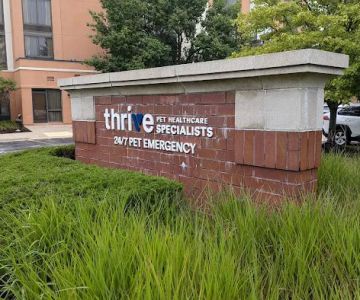The Vital Role of Balanced Nutrition for Your Pet's Health
As a pet owner, ensuring the health and well-being of your furry companion is likely one of your top priorities. One of the most critical factors in maintaining a long, healthy life for your pet is proper nutrition. Just like humans, pets need a balanced diet to stay fit, energetic, and free from illness. Whether you're a seasoned pet owner or a new pet parent, understanding the importance of balanced nutrition is essential in keeping your pet happy and healthy.
The Building Blocks of Pet Nutrition
At the core of a balanced pet diet are the same key nutrients that we, as humans, require: proteins, carbohydrates, fats, vitamins, and minerals. However, each pet has unique nutritional needs based on their species, size, breed, and activity level. Therefore, it's crucial to choose food that is specifically formulated for your pet’s type and stage of life. Let's break down the essential nutrients and their roles in your pet's overall health:
- Proteins: Proteins are the building blocks of your pet’s body. They support muscle growth, tissue repair, and the production of enzymes and hormones. Animals like dogs and cats are obligate carnivores or omnivores, which means they need a high-protein diet to thrive.
- Carbohydrates: Carbs are often overlooked, but they are essential for providing energy. They help fuel your pet’s daily activities, especially for highly active pets. Whole grains and vegetables are great sources of complex carbohydrates that offer fiber and other nutrients.
- Fats: Fats are a concentrated source of energy and support healthy skin and a shiny coat. Omega-3 and Omega-6 fatty acids also play a vital role in reducing inflammation and supporting brain health.
- Vitamins and Minerals: These micronutrients are needed in small quantities but are crucial for your pet’s overall health. They support immune function, bone health, and cell regeneration. A balanced pet food should contain the right amounts of vitamins A, D, E, and B-complex vitamins, along with essential minerals like calcium, phosphorus, and magnesium.
The Risks of Poor Nutrition
Feeding your pet the wrong diet or neglecting their nutritional needs can lead to a range of health problems. I’ve witnessed several cases where pets developed conditions due to improper diet. For example, one of my friends had a Labrador Retriever who was constantly lethargic and prone to skin infections. After a trip to the vet, it was discovered that the dog had a vitamin deficiency due to a poorly balanced diet. Once they switched to a high-quality dog food with proper nutrients, the dog’s energy levels soared, and the skin issues cleared up.
Some of the most common risks associated with poor nutrition include:
- Obesity: Overfeeding or providing foods high in fat and carbohydrates can lead to obesity. This can result in joint problems, heart disease, and diabetes in pets.
- Weakened Immune System: A lack of essential vitamins and minerals can compromise your pet’s immune system, leaving them more susceptible to illnesses.
- Dental Problems: Inadequate nutrition can lead to poor oral health. Pets fed low-quality food may experience gum disease, tooth decay, and bad breath.
- Shorter Lifespan: Pets that are fed poorly may have a shorter life expectancy due to chronic health problems like kidney disease, heart failure, and digestive issues.
Choosing the Right Food for Your Pet
Choosing the right food can be overwhelming with so many options available on the market. The key is to look for high-quality pet foods that are tailored to your pet’s specific needs. Consider your pet’s breed, size, age, and health status when making your decision. For example, puppies and kittens require food with higher protein and fat content to support their growth, while senior pets may benefit from a diet rich in joint-supporting nutrients like glucosamine.
Here are some tips to help guide you in choosing the best food for your pet:
- Read the Labels: The first ingredient should be a high-quality animal protein source like chicken, lamb, or beef. Avoid foods that list by-products or fillers like corn or soy as the primary ingredients.
- Consult Your Veterinarian: If you're unsure which food is best for your pet, ask your vet for a recommendation. They can provide insight into any specific dietary needs or restrictions your pet may have.
- Consider Special Diets: Some pets may require a special diet due to allergies, sensitivities, or health conditions. There are many grain-free, hypoallergenic, or low-fat options available.
- Quality Ingredients: Look for food that uses high-quality ingredients, such as whole grains, fresh vegetables, and high-grade meats, to ensure your pet is getting a balanced meal.
The Importance of Portion Control
Even if you're feeding your pet a balanced diet, portion control is essential to prevent overfeeding or underfeeding. Pets have different caloric needs depending on their size and activity level. Overfeeding can lead to obesity, while underfeeding can result in malnutrition. Many pet foods provide guidelines on serving sizes, but it’s essential to adjust based on your pet's specific needs.
Another factor to keep in mind is treats. While treats are an excellent way to reward your pet, they should not exceed 10% of your pet’s daily caloric intake. Be mindful of the calories in each treat to avoid unintentional weight gain.

2700 W Higgins Rd, Hoffman Estates, IL 60169, USA
See DetailsCreating a Balanced Meal Plan for Your Pet
As a responsible pet owner, I always make sure to follow a balanced meal plan for my pets. This helps ensure they receive all the nutrients they need while avoiding overfeeding. I follow these steps:
- Consult with My Vet: Before creating any new meal plan, I make sure to talk to my vet to ensure it aligns with my pet’s needs.
- Choose a High-Quality Pet Food: I pick a pet food that’s nutritionally complete and designed for my pet’s specific age, breed, and activity level.
- Measure the Food: I always measure my pet’s food to ensure I’m feeding the correct portion size, and I avoid free-feeding.
- Offer Fresh Water: I always make sure my pet has access to clean, fresh water at all times, which is just as important as the food they eat.
- Monitor My Pet’s Weight: I regularly check my pet’s weight to ensure they’re maintaining a healthy weight, adjusting portions or food as necessary.
By following these simple steps, I’ve seen the positive impact that proper nutrition can have on my pets' overall health and energy levels. A balanced diet is an investment in your pet's long-term well-being and can help prevent many health problems in the future.
If you're looking for more personalized pet care, consider visiting Hidden Brook Veterinary for expert guidance on nutrition and health care. A professional can help you tailor your pet’s diet to meet their specific needs and ensure they stay healthy and happy for years to come.










